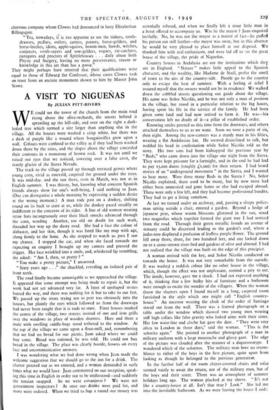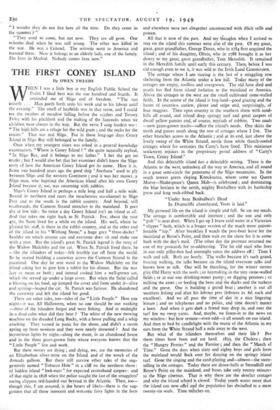A VISIT TO NIGUENAS
By JULIAN PITT-RIVERS
WE could see the tower of the church from the main road rising above the olive-orchards, the streets behind it sprawling up the hill-side, and over on the right a dark- leafed tree which seemed a size larger than anything else in the village. All the houses were washed a crisp white, but there was a dash of purple like a wound where bougainvillea grew upon a wall. Colours were confined to the valley as if they had been washed down there by the rains, and the slopes above the village concealed their contours in a monotony of brown rock. It was not until we raised our eyes that we noticed, towering over a false crest, the stately glacier of the Sierra Nevada.
The track to the village passed up through terraced groves where young corn, vivid as emerald, carpeted the ground under the trees. It was mid-day. and the sun there, csen in March, was not as in English summer. I was thirsty, but, knowing what concern Spanish friends always show for one's well-being, I said nothing to Juan. (One can disorganise a whole morning by expressing a sudden desire at the wrong moment.) A man rode past on a donkey, shifting round on its back to stare at us, while the donkey paced steadily on indifferent to the concerns of its rider. A line of old women wearing straw hats incongruously over their black smocks advanced through the corn, weeding Another, too old no doubt for such work, threaded her way up the dusty road. She had a face the colour of alabaster, and her skin, though it was lined like my map with age, clung firmly to the bone. As she stopped to watch us pass I saw my chance. I stopped the car, and when she faced towards me expecting an enquiry I brought up my camera and pressed the trigger. Her face wrinkled into a smile, and, whiskered lip trembling, she asked: " Am I, then, so pretty ? "
"You make a pretty picture," I answered.
" Sixty years ago . . ." she chuckled, revealing an isolated pair of front teeth.
The road finally became unnavigable as we approached the village. It appeared that some attempt was being made to repair it, but the work had not yet advanced very far. A layer of unshaped stones barred the way, and there was nothing for it but to take to our feet. We passed up the street trying not to peer too obviously into the houses, but plainly the eyes which followed us from the doorways had never been taught that it is rude to stare. Finer houses marked the centre of the village, two storeys instead of one and iron grills over the windows in place of wooden shutters. Here and there a mule with swelling saddle-bags stood tethered to the window. At the top of the village we came upon a flour-mill, and, remembering that we had no bread for our picnic, Juan asked where we could buy some. Bread was rationed, he was told. He could not buy bread in the village. The place was clearly hostile, frowns on every face and uncommunicative answers.
I was wondering what we had done wrong when Juan made the welcome suggestion that we should go to the inn for a drink. The chatter petered out as we entered, and a woman demanded in surly tones what we would have. Juan commented on our reception, speak- ing this time in English in order not to be understood—and suddenly the tension snapped. So we were estranjeros ? We were not government inspectors ? At once our• drinks were paid for, and more were ordered. When we tried to buy a round our money was scornfully refused, and when we finally left a stout little man in a beret offered to accompany us. Was he the mayor ? Juan enquired tactfully. No, he was not the mayor as a matter of fact—he puffed his person out still further—the mayor was away, but in this absence he would be very pleased to place himself at our disposal. Wo thanked him with real enthusiasm, and were led off to :cc the great house of the village, the pride of Niguctias.
Country houses in Andalusia are not the institutions which they are in England. "Nature " makes little appeal to the Spanish character, and the wealthy, like Madame de Stail, prefer the smell of town to the airs of the country-side. People go to the country only to escape the heat of summer. With a feeling of relief I assured myself that the owners would not be in residence We walked down the cobbled streets questioning our guide about the village. His name was Seiior Nicolas, and he was not only a man of position in the village, but stood in a particular relation to the big house, having spent his life in the service of the family. He had been given some land and had now retired to farm it. He was—his conversation left no doubt of it—a pillar of established order.
Knowing smiles greeted us this time from the doorways, and others attached themselves to us as we went. Soon we were a party of six, then eight. Among the new-corners was a sturdy man in his fifties, wearing a flat Andalusian hat. He seemed disinclined to talk, but nodded his head in confirmation while Senor Nicolas told us the story. His two sons had been kidnapped the previous year by " Reds," who came down into the village one night from the Sierra. They were kept prisoner for a fortnight, and in the end he had had to pay z5,000 duros (roughly kt,000) for their return. I had heard stories of an "underground movement" in the Sierra, and I wanted to hear more. Were there many Rcds in the Sierra ? No, Setior Nicolas explained, there used to be many, but by now most had either been amnestied and gone home or else had escaped abroad. There were only a few left, and they had become professional bandits. They had to get a living somehow.
At last we turned under an archway, and, passing a sleepy police- man sitting astride a chair, entered a garden. Beyond a hedge of japanese pear, whose waxen blossoms glistened in the sun, stood two magnolias which together formed the giant tree I had noticed from the road. Through their green metallic fronds an avenue of statuary could be discerned leading to the garden's end, where a judas-tree displayed a profusion of leafless purple flower. The ground fell away there, sheer, for two hundred feet, and one looked down on to a stone-strewn river-bed and gardens of olive and almond. I had not realised that the village was built on the edge of this precipice.
A woman arrived with the key, and Senor Nicolas conducted us towards the house. It was not very remarkable from the outside. It was washed a reddish colour like no other house in the village; which, though the effect was not unpleasant, seemed a pity to me.' The inside, however, gave me a shock. I had not expected anything of it, thinking that a few bulky bits of furniture and a bathroom were enough to excite the wonder of the villagers. When the woman threw the shutters open I found myself in a long, carpeted room furnished in the style which one might call " English country- house." An ancestor wearing the cloak of the order of Santiago stared out from the wall. There was a framed photograph on a table under the window which showed two young men wearing stiff high collars like false gravity who linked arms with their sister. Her low waist-line and cloche hat gave the date. "They went very often to London in those days," said the woman. " This is the setiorito again." She pointed to another photograph of a man in military uniform with a large moustache and glassy gaze. The odge of the picture was clouded after the manner of a daguerreotype. I wondered which of the sciioritos. The military man bore no resem- blance to either of the boys in the first picture, quite apart from looking as though he belonged to the previous generation.
In the further half of the room chintz-covered chairs and sofas seemed vainly to await the return, not of the military man, but of the boys and their sister. There was an atmosphere of summer holidays long ago. The woman plucked at my sleeve. " It's not like a country-house at all. Isn't that true ? Look." She led me into the inevitable bathroom. As we were leaving the house I said: " I wonder they do not live here all the time. Do they come in the summer ? "
" They used to come, but not now. They are all gone. One senorito died when he was still young. The other was killed in the war. He was a Colonel. The senorita went to America and married there. Now it belongs to an elderly lady, one of the family. She lives in Madrid. Nobody comes here now."



































 Previous page
Previous page